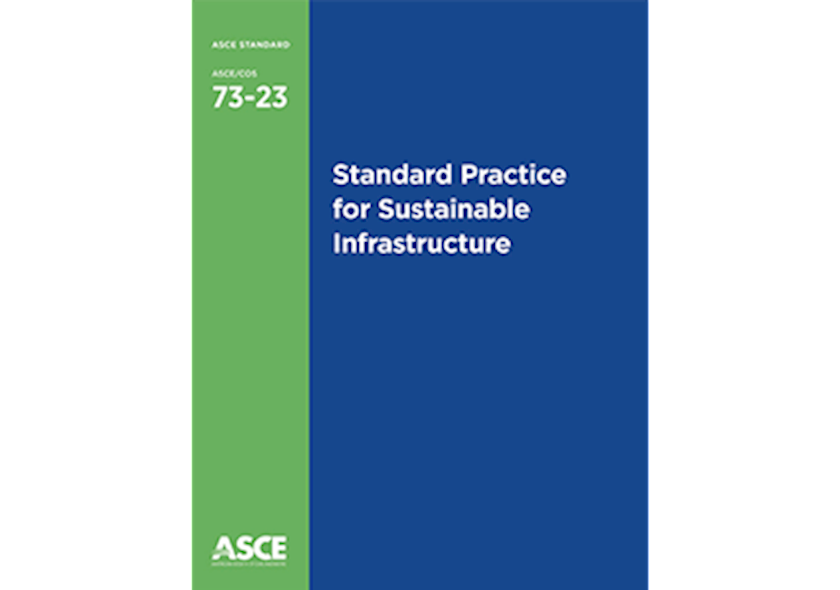Developing Sustainable Communities ASCE 73-23

Standard Practice for Sustainable Infrastructure, ASCE/COS 73-23
ASCE 73 is a first-of-its-kind, performance-based standard that provides infrastructure owners with much-needed guidance on their obligations to develop and implement sustainable solutions over a project’s entire life cycle.
The standard calls for infrastructure owners to develop infrastructure that:
- Achieves environmental benefits and resilience measures and reduces embodied carbon.
- Reuses existing infrastructure to the extent possible.
- Reduces energy demand for a project and uses renewable energy sources.
- Reduces waste and hazardous materials over the life cycle of the project.
- Engages community involvement to enhance community liveability, health and safety.
- Creates jobs and provides skills development to those in the community who wish to participate in construction of the project.
What is covered by Standard ASCE/COS 73-23?
- Sustainability Leadership
- Quality of Life
- Resource Allocation
- Natural World
- Greenhouse Gas Emissions
- Resilience Life-Cycle
- Cost Analysis
One of the most reliable ways to ensure increased performance and resilience of our nation’s built environment is the widespread adoption and enforcement of up-to-date, modern building codes and standards.
Who develops standards?
ASCE’s volunteer technical committees work collaboratively to develop standards that advance the civil engineering industry. The Structural Engineering Institute of ASCE and specifically the Seismic Evaluation and Retrofit of Existing Buildings Committee work to update ASCE 41. Standards development is generally on a five-year cycle to revise or reaffirm existing standards. Voting members represent a cross-section of the industry including producers, consumers, and regulatory entities.ASCE is an ANSI-accredited standards development organization (SDO). ASCE Standards provide technical requirements or guidelines for promoting safety, reliability, productivity, and efficiency in civil engineering.
How does ASCE 73-23 help communities?
This standard provides guidance to infrastructure owners, engineers, and contractors on the creation of projects that minimize the environmental impact and protect natural ecosystems, while simultaneously meeting the diverse needs of communities.
- Eco-friendly solutions such as recycling of infrastructure materials, reducing energy demands, and using renewable energy sources to lower the project's overall carbon footprint are highly encouraged.
- Job creation within a project’s community is emphasized.
- Preserving cultural resources and facilitating community engagement ensures equity, improves the quality of life, and integrates the infrastructure solution into the community.
- Life-cycle cost analysis requirements are included to optimize the allocation of private and public funds and ensure that economic, social, environmental, and climate resilience benefits are achieved over the life of the project.
Who is using it?
As a performance-based standard, ASCE 73 establishes broad outcomes that can be achieved through a number of methods. Tools such as the Envision rating system can be used by project owners to assess achievement of these outcomes.
Companies and organizations are exploring ways to apply these outcomes across a range of infrastructure projects, including regional transportation, airport redevelopment, wastewater treatment and collection, renewable energy implementation, sustainable parking lots, and more.”
Endorsed by the World Federation of Engineering Organizations
WFEO’s Executive Board, representing 100 nations, believes that the principles outlined in the standard align with WFEO’s mission and the UN Sustainable Development Goals and encourages its member institutions to share the standard.
ASCE 73-23 is available in:
- Print (Soft Cover)
- E-book PDF
- Interactive digital access on the ASCE AMPLIFY platform
How do ASCE 73-23 and the ENVISION rating system interact?
The standard serves as a complement to the Envision rating system for sustainable infrastructure. Standard 73-23 addresses development and implementation of sustainable infrastructure solutions by meeting stakeholder needs and issues through the entire infrastructure life cycle. Envision is a sustainable infrastructure rating system that serves as a common method of measuring progress.